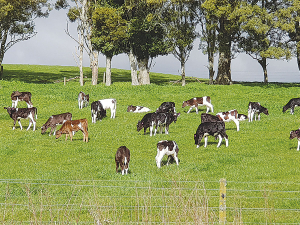The company behind probiotic additive Calf Xtreme says around 450 dairy farms are successfully rearing calves with the help of the product.
Probiotic Revolution says that while many of these farms were already achieving target liveweights, Calf Xtreme has enabled them to exceed those benchmarks.
The company claims that by incorporating the product, farmers are reaching target weaning weights about eleven days earlier. This is achieved through feeding higher volumes of milk on a once-a-day schedule within the calves’ first week.
“Calf Xtreme is avoiding scours on this high feeding regime but it’s the carry-over effects that we are even more excited about. It’s like putting icing on the cake,” says Chris Collier of Probiotic Revolution.
“We’re introducing the right microbes into the rumen, promoting better grass consumption after weaning, and there’s solid evidence of stronger resistance to worms. On heifer grazing blocks with high worm burdens, calves reared with Calf Xtreme show noticeably improved growth rates during their first summer.”
Te Awamutu farmer Nick Palairet was among the first to adopt Calf Xtreme.
“When I started rearing calves 12–15 years ago, the focus was on early weaning onto meal, which restricted early growth,” Palairet says.
“With Calf Xtreme, I can easily transition calves to 6 litres of milk once a day within a week. Last year, by grazing them at home and managing summer feed more effectively, my calves reached 280kg by June— 40kg above the target liveweight for that age."
Palairet and Collier emphasise the importance of maximising calf growth during the first 3-5 weeks of life. They point out that European research supports this, showing that better udder tissue development in very young calves translates to improved milk production later. Additionally, they advocate for calving heifers at the same liveweight as mature cows, ensuring comparable production levels.
Palairet’s herd starts calving on July 10th, and by March, most of his rising two-year-old heifers weigh around 500kg—approaching the liveweight of mature cows. His goal isn’t just to meet conventional targets but to surpass them, unlocking the full genetic potential of his heifers. To achieve this, he has for the first time this year fortified their 6-litre milk feed with 400 grams of a whey-based powder.
Palairet’s calves, bred from Friesian sires over mixed-breed cows, are thriving on this latest change. By November 20th, they were averaging one kg of growth per day from birth, weighing between 100 and 170kg — 15kg above the target for their age.
“If I want my heifers to milk as well as mature cows I need to grow better heifers. It all starts with how quickly I can accelerate their growth at a young age,” he says.


















